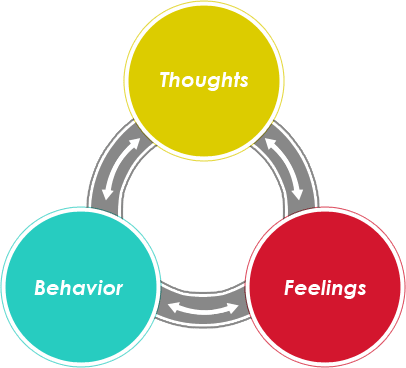
Childhood, adolescence, and emerging adulthood are periods of significant growth that include important developmental milestones including: language and communication skills, puberty and ongoing brain development, as well as the need for increased independence and autonomy. These periods are complicated by major social role transitions within the family, peer group, school, and community that either assist or impede healthy development. As a result of a myriad of biopsychosocial stressors, it is common to experience mental health difficulties such as anxiety and depression. Undetected and untreated mental health issues may negatively affect healthy development and become more significant problems during adulthood. Early intervention is imperative to move those struggling with mental health difficulties off of negative trajectories and to promote their healthy development.
Therapy & Coaching Services
In therapy I am personable, non-judgmental and take a creative and strengths-based approach to engaging clients. Working with children, I simplify methods and incorporate play, music, and visual multi-media to meet their developmental level. Given the significant role that parents and caregivers play in child and adolescent development, they are most always involved in the therapy process.
- Cognitive Behaviour Therapy
- Dialectical Behaviour Therapy
- Relaxation & Stress Management
- Sports Psychology/Performance Coaching
Cognitive Behaviour Therapy (CBT)
My primary approach to promoting wellbeing is cognitive behaviour therapy (CBT). CBT is an evidence-based approach, which means it has scientifically been demonstrated to be an effective treatment. There is an abundance of research evidence supporting its effectiveness in treating a variety of conditions commonly identified during childhood and adolescence. I provide CBT to address the following:
- ADHD and weak study skills
- Autism Spectrum Disorder – High Functioning
- Anger management
- Behavioural difficulties (e.g., tantrums, oppositional nature, etc.)
- Depression
- Entitlement
- Generalized anxiety and worry
- Impulse control
- Low self-esteem
- Obsessive-Compulsive Disorder (OCD)
- Panic attacks
- Perfectionism
- Performance anxiety
- Procrastination
- Relationship issues
- School refusal
- Selective mutism
- Self-harming
- Separation anxiety
- Social anxiety
- Specific phobias (e.g., flying, animals, dentist, etc.)
- Stress management
- Substance abuse
- Suicidality

CBT involves helping clients to understand the connection between their thoughts, feelings, behaviours, and triggers in their environments. CBT is short-term (approximately 10-20 sessions) and structured around meeting specific goals. It aims to educate the client, enhance self-awareness, and to teach skills and strategies to address problematic patterns of thinking and behaving. Homework is a central component of CBT and typically consists of self-monitoring tasks that promote insights into the presenting concerns. The practice of skills and techniques between sessions is also important to help consolidate and generalize gains from session.
In my practice, I also provide Attention Deficit Hyperactivity Disorder (ADHD) coaching to elementary, secondary, and post-secondary students. Using concrete strategies, clients work to develop skills in organization, planning, time management, task initiation, problem solving, as well as other techniques for reducing distractibility and enhancing academic performance.
Dialectical Behaviour Therapy (DBT)
Dialectical Behavior Therapy (DBT) is another form of evidenced-based treatment that I draw from to help clients meet their goals. DBT is a blend of cognitive and behavioural therapies that emphasizes acceptance-based therapeutic strategies. DBT involves helping clients to change ineffective patterns of behaviour, such as impulsively, self-harm, and suicidality. The goal of DBT is to teach clients the necessary skills to cope with stress, regulate their emotions, and improve the relationships in their lives. The core DBT skills include the following:
- Mindfulness
- Distress tolerance
- Emotional regulation
- Interpersonal effectiveness
- Walking the middle path
I believe the DBT skills are concrete and intuitive. They can be used to help clients control their feelings, impulses, manage and cope with stress, and make informed decisions in stressful situations. In my practice, I utilize DBT strategies when necessary to meet the needs of the client.
Relaxation & Stress Management
Stress is a necessary and normal part of life. We need stress to facilitate our growth and survival. Stress and anxiety both activate the autonomous nervous system and the ‘flight and fight’ response. While this bodily reaction may save your life in rare threatening situations, stress and anxiety are harmful when they occur every day and interrupt the optimal balance of your nervous system. Over time, stress and anxiety can cause the body and mind to wear down, which may lead to emotional ‘burnout’ or to feeling physically ill.
The body’s relaxation response (parasympathetic nervous system) counteracts stress by calming the heightened ‘flight and fight’ response and by restoring the balance of the nervous system. In therapy, we learn and practice exercises and activities that relax your body and mind. A variety of relaxation techniques exist and there is no one technique that best suits everyone. In my practice I use relaxation techniques such as guided imagery, deep diaphragm breathing, and progressive muscle relaxation. I work with clients to determine which relaxation techniques best suit their needs.
Essentially, this form of self-monitoring assists clients in determining which relaxation techniques are most effective in reducing stress. Another goal is to enhance the client’s ability to activate and strengthen their relaxation response. With practice, clients can also develop an enhanced awareness of the connection between their thoughts and emotional experiences, which is integral to CBT and DBT.
Sports Psychology/Performance Coaching
The field of sport psychology uses mental strategies and knowledge to help elite clients consistently reach their optimal level of performance and well-being. At BCAPS, clients will learn to strengthen their mental skills in the following areas:
- Developing a disciplined “process-oriented” approach
- Motivation/goal setting
- Dealing with pressure, anxiety, and nerves
- Focus/concentration and locking into “flow” and the “zone”
- Leadership skills
- Self-confidence
- Responding to mistakes, loss, failure, and injury
